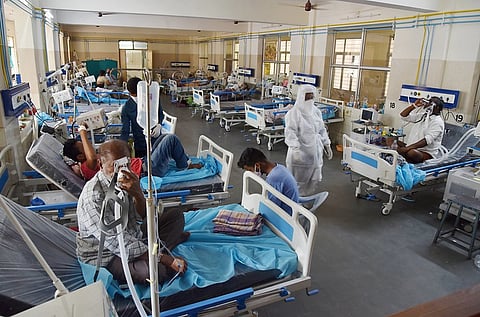

Follow TNM’s WhatsApp channel for news updates and story links.
With a health emergency declared in Turakapalem village of Guntur district in Andhra Pradesh following nearly 23 unexplained deaths in the past two months, health department officials are performing death audits and testing blood samples of residents to identify the cause.
So far, one confirmed case of melioidosis, a bacterial infection, has been detected in the village, Guntur District Medical and Health Officer (DMHO) Dr Vijaya Lakshmi told TNM.
Melioidosis is an infection caused by a bacterium called Burkholderia pseudomallei. It spreads through direct contact with soil or water, via breaks in the skin or ingestion. Symptoms include fever, cough, headache etc., and the infection can turn fatal.
Based on this confirmed case of melioidosis, officials suspect it may have contributed to the recent deaths, but tests are still being done to confirm this, Dr Vijaya Lakshmi said.
“We normally witness around two to three deaths in a month in Turakapalem. But when the number rose to 10 deaths each in July and August, we had to probe what happened. So far, 75 samples have been taken for a bacteria culture test, and nearly everyone in the village has been screened based on 41 routine parameters. The samples have been sent to Vijayawada and Guntur district hospital,” the DMHO said.
Located about 6 km from Guntur city, she said that Turakapalem has a population of about 2,500.
“In the meantime, given that melioidosis is caused by a bacteria found in soil and water, the district administration has been supplying food and drinking water to Turakapalem from Guntur. Residents have been advised to avoid consuming food and water from the village and to refrain from walking barefoot," Dr Vijaya Lakshmi said.
Along with death audits, bacterial culture tests are being conducted on symptomatic or high-risk individuals, particularly those with fever or underlying conditions such as diabetes, the DMHO told local media on September 8. Fourteen of the mysterious deaths reportedly occurred in hospitals.
Dr Vijaya Lakshmi added that the individual with a confirmed melioidosis infection is being treated in a private hospital.
The DMHO also mentioned that many of the deceased had pre-existing conditions such as diabetes, kidney disease, or other immunosuppressive disorders, which may have increased their vulnerability to infections like melioidosis.
“Since Turakapalem is largely an agricultural village, the bacteria could have entered from the soil through cracks in the feet. Four of the deceased persons were stone crushers, so there’s a chance of contaminants in the soil entering the body through abrasions in the skin,” the DMHO said.
Health Minister Satya Kumar Yadav earlier confirmed that Turakapalem recorded 23 deaths between July to September 3.
Meanwhile, the opposition YSR Congress Party (YSRCP) has blamed the coalition government, alleging that contaminated drinking water and official apathy caused the crisis.